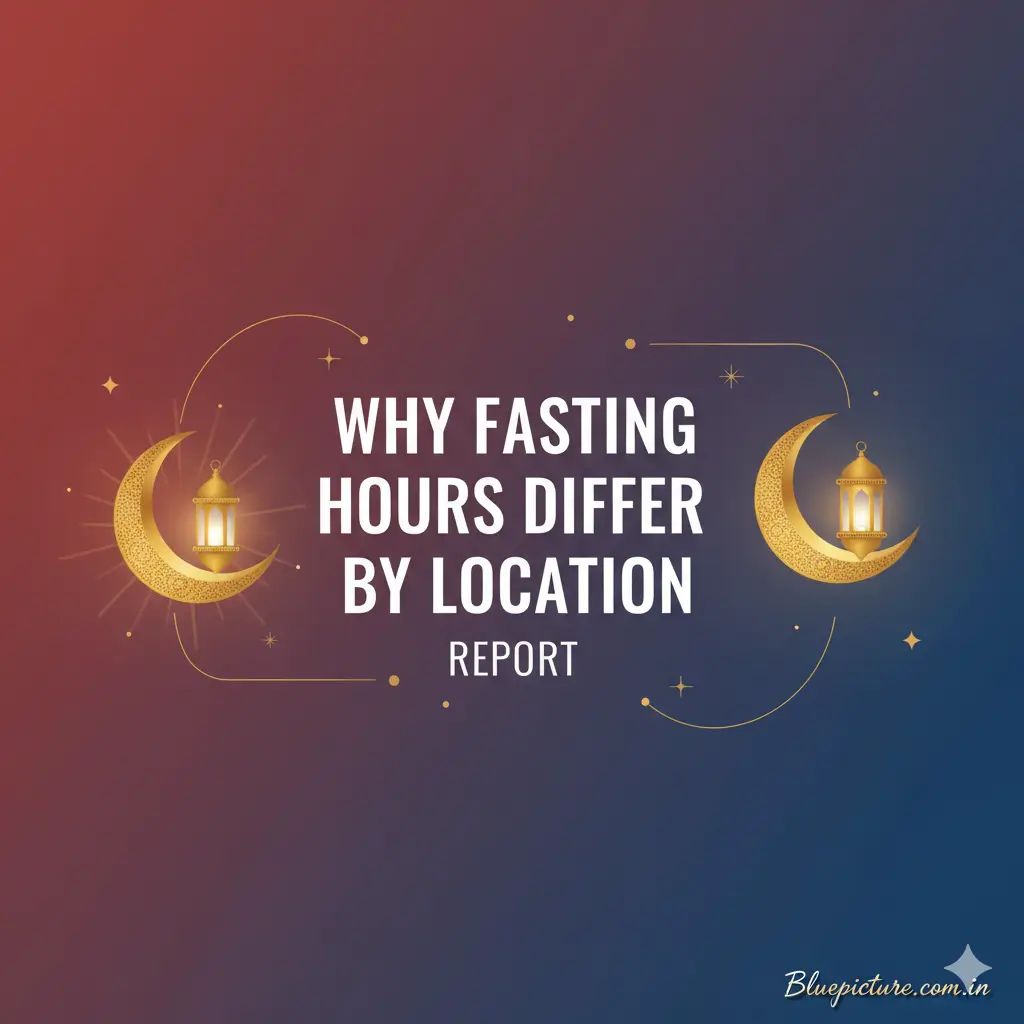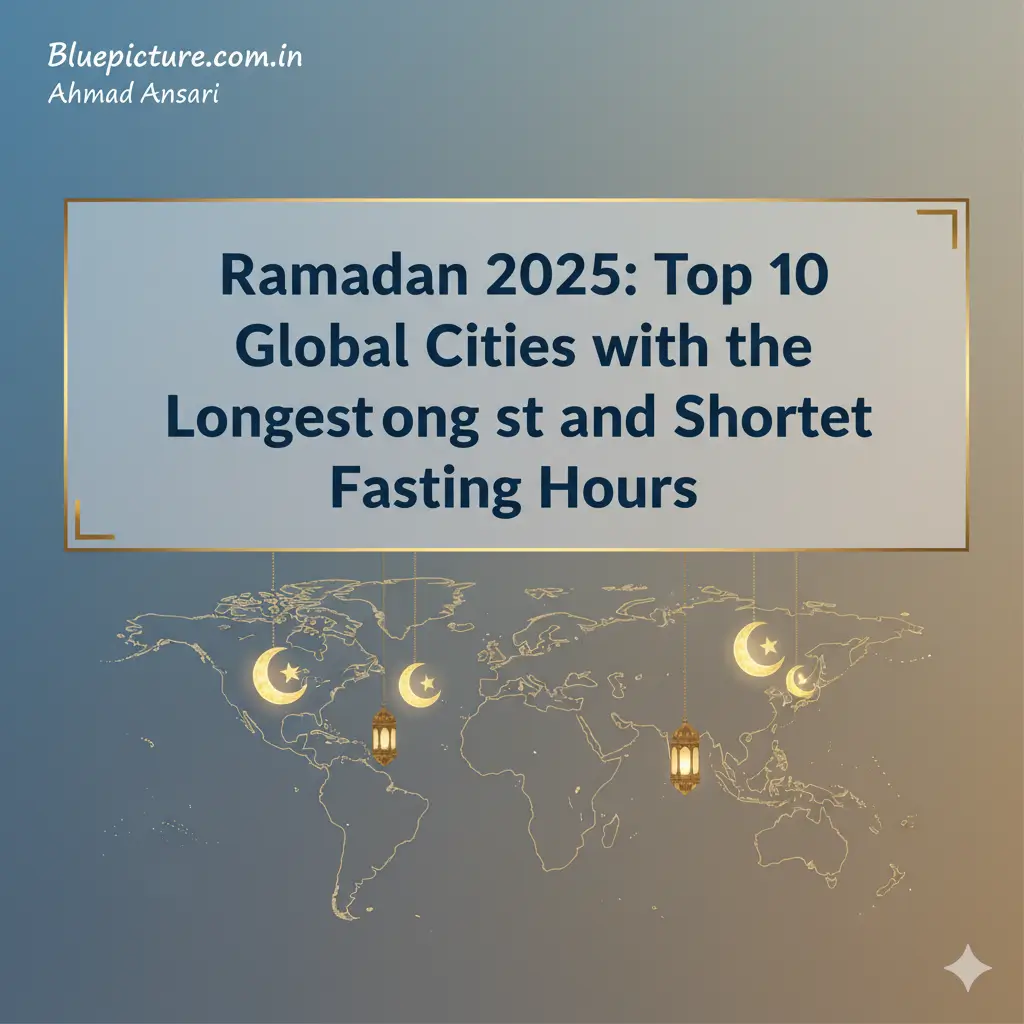As the holy month of Ramadan 2025 draws near, a beautiful sense of peace and anticipation fills the hearts of Muslims everywhere. Soon, millions around the world will begin their fasts — rising before dawn for suhoor, spending the day in prayer and patience, and breaking their fast with iftar as the sun sets. Ramadan is more than just abstaining from food and drink; it’s a month of reflection, gratitude, and unity for the entire Muslim Ummah.
What many don’t realize, however, is that fasting hours in Ramadan 2025 will vary greatly across the globe. In northern cities like Reykjavik, Oslo, and Helsinki, Muslims may fast for nearly 18 to 19 hours each day. Meanwhile, in southern regions such as Cape Town or Buenos Aires, the fast could last just around 11 hours. Despite these differences, believers everywhere share the same faith, strength, and devotion.
When Does Ramadan 2025 Begin?
The holy month of Ramadan 2025 is expected to begin around March 1, 2025, depending on the sighting of the crescent moon, which marks the start of the Islamic month of Sha’ban 1446 AH. Because the Islamic calendar follows the lunar cycle, the exact start date of Ramadan can vary slightly from country to country sometimes by one day.
In many Muslim-majority countries like Saudi Arabia, Pakistan, Egypt, and Indonesia, local moon-sighting committees will confirm the official beginning of the month. Other nations, including the United Kingdom, the United States, and Canada, often follow announcements made by prominent Islamic authorities or rely on astronomical calculations.
No matter where Muslims live, the arrival of Ramadan brings the same deep sense of excitement and spiritual renewal. Families begin preparing for suhoor and iftar, mosques light up for taraweeh prayers, and communities come together to welcome the most sacred month of the year ,a time of mercy, forgiveness, and unity across the globe.
You Also Read: What Are the Articles of Faith in Islam? A Complete Guide
Why Fasting Hours Differ by Location

One of the most fascinating things about Ramadan 2025 is how fasting hours change from one part of the world to another. While the spiritual experience is the same everywhere, the length of the fast depends entirely on where you live. The reason lies in how the Earth tilts on its axis and how that affects daylight hours in different regions.
In countries located near the equator such as Indonesia, Kenya, or Malaysia day and night are almost equal throughout the year. That means Muslims there will fast for roughly 12 to 13 hours each day. However, as you move toward the northern or southern poles, daylight hours become much longer or shorter, especially during spring and summer.
For example, in northern cities like Reykjavik or Oslo, the sun sets very late, leading to fasts of up to 18 or 19 hours. Meanwhile, in southern cities such as Cape Town or Buenos Aires, the days are shorter, so fasts last only about 11 hours.
Despite these differences, Muslims across the globe begin and end their fasts according to the same spiritual principles — from dawn (Fajr) to sunset (Maghrib) — united in devotion, patience, and faith, no matter how long the day may be.
Top 10 Cities with the Longest Fasting Hours in Ramadan 2025
| Rank | City | Country | Approx. Fasting Duration (2025) |
|---|---|---|---|
| 1 | Reykjavik | Iceland | 18 hours 45 minutes |
| 2 | Oslo | Norway | 18 hours 20 minutes |
| 3 | Helsinki | Finland | 17 hours 50 minutes |
| 4 | London | United Kingdom | 16 hours 30 minutes |
| 5 | Berlin | Germany | 16 hours 10 minutes |
| 6 | Paris | France | 15 hours 55 minutes |
| 7 | Istanbul | Türkiye | 15 hours 30 minutes |
| 8 | Toronto | Canada | 15 hours 10 minutes |
| 9 | Chicago | United States | 14 hours 45 minutes |
| 10 | Tehran | Iran | 14 hours 30 minutes |
Top 10 Cities with the Shortest Fasting Hours
| Rank | City | Country | Approx. Fasting Duration (2025) |
|---|---|---|---|
| 1 | Cape Town | South Africa | 11 hours 00 minutes |
| 2 | Buenos Aires | Argentina | 11 hours 10 minutes |
| 3 | Johannesburg | South Africa | 11 hours 15 minutes |
| 4 | Sydney | Australia | 11 hours 30 minutes |
| 5 | Wellington | New Zealand | 11 hours 40 minutes |
| 6 | Jakarta | Indonesia | 12 hours 00 minutes |
| 7 | Kuala Lumpur | Malaysia | 12 hours 10 minutes |
| 8 | Nairobi | Kenya | 12 hours 15 minutes |
| 9 | Singapore | Singapore | 12 hours 20 minutes |
| 10 | Lima | Peru | 12 hours 30 minutes |
🌙 Global Fasting Experience: Faith Beyond Hours
No matter how long or short the fasting hours may be, the true essence of Ramadan 2025 goes far beyond time and geography. Muslims across the world share the same purpose — to seek closeness to Allah, practice patience, and strengthen their faith through self-discipline and reflection. Whether one is fasting for 19 hours in Iceland or 11 hours in South Africa, the spiritual reward remains equal in the eyes of Allah.
Ramadan unites millions of believers through a shared rhythm of worship — from the calm of suhoor before dawn to the joy of iftar at sunset. In every city and every home, Muslims recite the Qur’an, give charity, and come together in prayer, finding peace in the collective act of devotion. This global experience reminds us that fasting is not measured by hours, but by the sincerity of one’s heart.
As the sun sets across different horizons, the spirit of Ramadan 2025 shines the same — a light of faith, gratitude, and compassion that connects the entire Muslim Ummah beyond borders and time zones.
🕰️ How to Manage Long Fasting Hours

Fasting for extended periods during Ramadan 2025 can be physically and mentally challenging, especially in regions where daylight lasts up to 18 or 19 hours. However, with mindful preparation and healthy habits, Muslims can manage long fasting hours while maintaining their energy and focus throughout the day.
Start by having a balanced suhoor that includes slow-digesting foods such as oats, whole grains, eggs, and fruits. These provide lasting energy and help prevent fatigue. Staying well-hydrated is equally important — drink plenty of water between iftar and suhoor, and limit caffeine, which can lead to dehydration. During iftar, break your fast gently with dates and water, followed by light, nutritious meals instead of heavy fried foods.
Adequate rest and sleep also play a major role in maintaining stamina. Short naps during the day can help you recover energy. Most importantly, maintain a calm routine focused on prayer, reflection, and gratitude.
Managing long fasting hours in Ramadan isn’t just about physical endurance — it’s about spiritual balance. With the right nutrition, rest, and mindset, every believer can find peace and strength throughout Ramadan 2025.
Frequently Asked Questions
When does Ramadan 2025 start?
Ramadan 2025 is expected to begin around March 1, 2025, depending on the moon sighting. The exact date may vary by country, following local Islamic authorities.
How long will Muslims fast in Ramadan 2025?
Fasting hours in Ramadan 2025 vary by location — from about 11 hours in southern cities to up to 19 hours in northern regions. All fasts are observed from dawn (Fajr) to sunset (Maghrib).
Why do fasting hours differ around the world?
Fasting hours depend on daylight duration, which changes with latitude. Countries near the equator have nearly equal day and night, while northern and southern regions experience longer or shorter days.
What are the best tips for managing long fasting hours?
Eat a nutritious suhoor, stay hydrated, rest adequately, and avoid heavy meals at iftar. These practices help maintain energy and focus during long fasting hours.
Can children or elderly fast during Ramadan 2025?
Children, the elderly, pregnant, or sick individuals may be exempt from fasting. Islam allows flexibility for health and safety, with missed fasts made up later if possible.
How can I find Ramadan 2025 timings for my city?
Check local mosques, Islamic centers, or reliable websites like IslamicFinder.org to get accurate suhoor and iftar timings for your location.
🌟 Key Takeaways from Ramadan 2025 Fasting Hours
- Fasting hours vary globally: Northern cities may have up to 19 hours, while southern regions may fast around 11 hours.
- Spiritual essence remains same: Despite different durations, the reward and devotion of Ramadan is equal for all believers.
- Preparation is crucial: A balanced suhoor, proper hydration, and sufficient rest help manage long fasting hours effectively.
- Moon sighting determines start: Ramadan 2025 is expected around March 1, 2025, with slight variations by country.
- Community spirit matters: Shared iftars, prayers, and charity connect Muslims worldwide, making fasting a unifying experience.
- Adaptation for long fasts: In extreme daylight regions, shorter naps and light meals improve energy and focus during the day.
- Local timings are essential: Always refer to your city’s suhoor and iftar timings for accurate fasting schedule.
Conclusion
Ramadan 2025 promises to be a spiritually enriching month for Muslims across the globe, uniting believers through devotion, patience, and reflection. While fasting hours vary significantly — from nearly 19 hours in northern cities to around 11 hours in southern regions — the essence of Ramadan remains the same everywhere. It is a time to strengthen faith, practice self-discipline, and connect with family and community.
The diversity in fasting durations highlights the remarkable adaptability of Muslims worldwide. Whether breaking the fast in Reykjavik’s late sunsets or Cape Town’s shorter days, every believer experiences Ramadan with sincerity and devotion. Understanding these differences not only informs us about global fasting practices but also deepens appreciation for the shared journey of the Ummah.
Ultimately, Ramadan 2025 is more than the number of hours spent without food or drink. It is a celebration of faith, gratitude, and unity across borders. By preparing properly, following local suhoor and iftar timings, and embracing the spiritual significance, Muslims can make the most of this blessed month — finding both personal growth and a profound connection with the global Muslim community.
